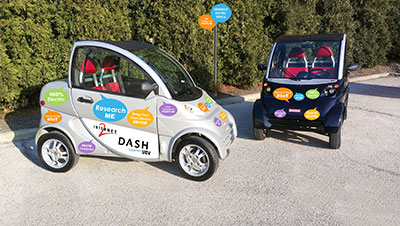4 Universities Receive Electric Vehicles for Internet of Things Research

The Innova Dash university electric vehicles will be connect automatically to the campus WiFi network and transmit a wide variety of data for research. |
This summer, Colorado State University, University of Pittsburgh, University of Washington and the University of Wisconsin-Madison will each receive four electric vehicles for a variety of sustainable research projects, including reducing the campus's carbon footprint; using vehicle sensor data; and broadening the understanding of the Internet of Things. As part of a project debuted at the Internet2 Global Summit this past April, the participating universities were selected by Internet2 and electric vehicle manufacturer Innova UEV from a pool of 11 applicants.
The Innova Dash all-electric "micro vehicles," known as university electric vehicles (UEVs), have a maximum speed of 35 mph, an estimated 100-mile range, and can plug into any standard garage 240-volt outlet. The vehicles will be equipped with a tablet-sized personal computer controlling a variety of electronics and sensors. The UEVs will connect automatically to the campus's WiFi network via an installed 802.11x certificate and Internet2's eduroam technology, allowing the vehicles to communicate operational data (such as position, speed and battery charge) for relevant research projects. A mobile application will inform users when a vehicle is available, where it is and where it will be. UEV users will be able to log in with their campus identification and password credentials provided by Internet2's InCommon service, and then reserve and activate the vehicles as well as provide comments on their performance and utility.
A key goal of the project is to integrate the vehicles into a broad range of campus research, said Steve Wolff, Internet2 interim chief technology officer, in a press conference today. The campuses will retain the UEVs for a year and share their research data among the group throughout the project. At the conclusion of the project, the aggregated data sets will be made available to the public.
"We are excited about these four campuses that are regional leaders in sustainability using these electric vehicles to enhance research, adopt advanced technologies, and enhance campus carbon footprint reductions" said Wolff in a prepared statement. "As more devices are connected to each other via the Internet and provide data that helps us make thoughtful decisions, it's key that the Internet2 research and education community is at the cutting-edge of the technology and opportunities. We look forward to learning the results from these Internet of Things' research projects and hearing, what's next."
The universities plan to utilize the vehicles in a variety of research projects, including: the effectiveness of public transportation; electric vehicle performance; physiological effects on drivers; commercial implications; gamification; and real-time data sharing. Data collected from the UEVs will also inform university awareness about driving habits, fuel efficiency, electric vehicles and more.
"With the Innova vehicles in the university motor pool, campus employees will have the opportunity to choose a unique and innovative vehicle option when they need to make off-campus trips," said Scott Baily, director of academic computing and networking services at Colorado State University, in a press release. "We are really excited about this opportunity to exploit CSU's exceptional commitment to sustainability, research and technology. We can capitalize on established research techniques to monitor, store and analyze vehicle performance data; accelerate our goal to achieve carbon neutrality by 2050; and explore the nuances of integrating electric vehicles into the daily lives of faculty, staff and students."
"We will utilize these electric vehicles to reduce the energy footprint of the campus community as a whole and [increase] awareness ... of the positive impact of electric vehicles; design strategies for optimally using a pool of electric vehicles by understanding how campus uses them; and explore techniques for improved connectivity between the Internet-based services and electric vehicles," said Suman Banerjee, professor of computer sciences at the University of Wisconsin-Madison. "This project aligns with the University of Wisconsin-Madison's efforts to address sustainability issues.... The campus has also made significant investments in infrastructure and community education that has significantly reduced energy consumption."
"Collaborative partnerships like this one effectively complement the university's sustainability efforts, offering concrete examples of sustainable practices using technology and collecting large data sets that can prompt future research questions," commented Patricia Beeson, Pitt provost and senior vice chancellor, in a press release.
"It's a fantastic research platform," said the University of Washington's Payman Arabshahi, an associate professor of electrical engineering and a principal research scientist with UW's Applied Physics Laboratory. "Among the biggest impacts here will be an opportunity for faculty and students from different departments to work with each other. We will have a mobile, fully connected and instrumented system with electrical, mechanical and chemical parts and applications in many engineering domains."
| Editor's note: This article has been modified since its original publication to add a quote from the University of Pittsburgh. [Last updated June 23, 2014 at 2:10 p.m. PDT] |
About the Author
Rhea Kelly is editor in chief for Campus Technology, THE Journal, and Spaces4Learning. She can be reached at [email protected].